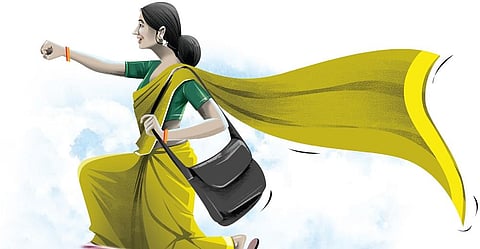

Not many took serious note of the vignette of kolams (rangoli) thanking Chief Minister M K Stalin in front of houses on September 15, the day he launched the Kalaignar Mahalir Urimai Scheme that gives Rs 1,000 a month to 1.06 crore women heads of families.
The traditional kolam, a prerogative of women who draw the patterns by sunrise, was once used by former chief minister M Karunanidhi to popularize his election symbol, the ‘Rising Sun’ in his maiden electoral contest from Kulithalai in 1957.
The ‘Rising Sun’ which was then a symbol of independence needed some publicity locally and Karunanidhi had asked the women to draw it in front of their homes even as he solicited their support. That the women obliged finds mention in his autobiography ‘Nenjukku Neethi’. In a polling booth for women at Thaneerpalli, the opponent Congress candidate did not get even a single vote when the constituency sent Karunanidhi to the Assembly, thanks to women.
The kolams thanking Stalin were not only reminiscent of Karunanidhi winning over women through his pioneering acts and schemes launched after the DMK came to power in 1967 like awarding property rights to women in the family but also pointed to the present chief minister endearing himself to women.
While eliciting the views of common people on the honorarium scheme, a woman in an Ariyalur village termed it “Thai Veetu Seethanam.” I was taken aback as her words contained some shade of MGR-ism in them.
Stalin, too, while launching the Puthumai Penn scheme benefiting women students, said, “I would support you like a father”. In a similar vein, during the launch of the Magalir Urimai scheme, Stalin spoke about the love and respect he had for women in his family, evoking the women’s sentiments with expressions like ‘Thayin Karunai’ (mother’s mercy), ‘manaiviyin uruthunai’ (wife’s support) and ‘magalin peranbu’ (daughter’s love).
A few days after the launch, I was talking with two acquaintances with political inclinations opposed to DMK. Both their wives had received Rs 1,000, which could mean that votes from their families may go over to the DMK.
Of course, the political affiliations of men do not necessarily influence the voting pattern of women in their families. Many men complained of their wives and mothers casting votes in favour of J Jayalalithaa and M G Ramachandran against their wishes.
Now with Stalin launching back-to-back schemes benefitting women, his popularity is increasing among them, going by their reactions. Schemes such as Vidiyal Payanam (free bus service for women), Puthumai Penn (Rs 1,000 monthly aid for girls going for higher studies) and CM’s breakfast scheme for school students have already become topics of discussion among women.
So the Kalaignar Magalir Urimai Scheme may be changing the political dynamics bringing more supporters to the DMK as first-time voters, women and subaltern classes are seemingly impressed by the welfare measures.
Though the DMK enjoyed substantial support from women for its schemes in its initial days, it lost it when MGR launched the AIADMK. MGR came in as a protector of women, an image cultivated through films and a personal aura created through his customary address of women as ‘Thai Kulam’.
MGR might not have launched any women-specific welfare project other than his signature mid-day meal scheme but remained an icon for women. His series of films with titles prefixed or suffixed with the ‘Thai’ (mother) evoked a maternal sentiment among voters.
Next came J Jayalalithaa, the former chief minister who enjoyed the lion’s share of support from women. The ubiquitous persona of MGR and the party’s traditional support base among subalterns helped her initially.
Later she cultivated an image as the champion of women. Besides schemes like Thottil Kuzanthai, free mixer-grinder, and free two-wheelers for working women, she was seen as a saviour of victims of sexual violence. She lived up to the image by sacking party leaders accused of disloyalty or misbehaviour by women and her women supporters never let her down.
The present DMK government’s targeted schemes aimed at uplifting women by changing their livelihood, dignity, honour and lifestyle are doing the same magic to Stalin’s image and popularity that Karunanidhi’s charisma, women’s faith in MGR and Jayalalithaa’s iron Lady image did in the past.
Footnote is a weekly column that discusses issues relating to Tamil Nadu
K Ezhilarasan is chief reporter of TNIE’s Tiruchy bureau